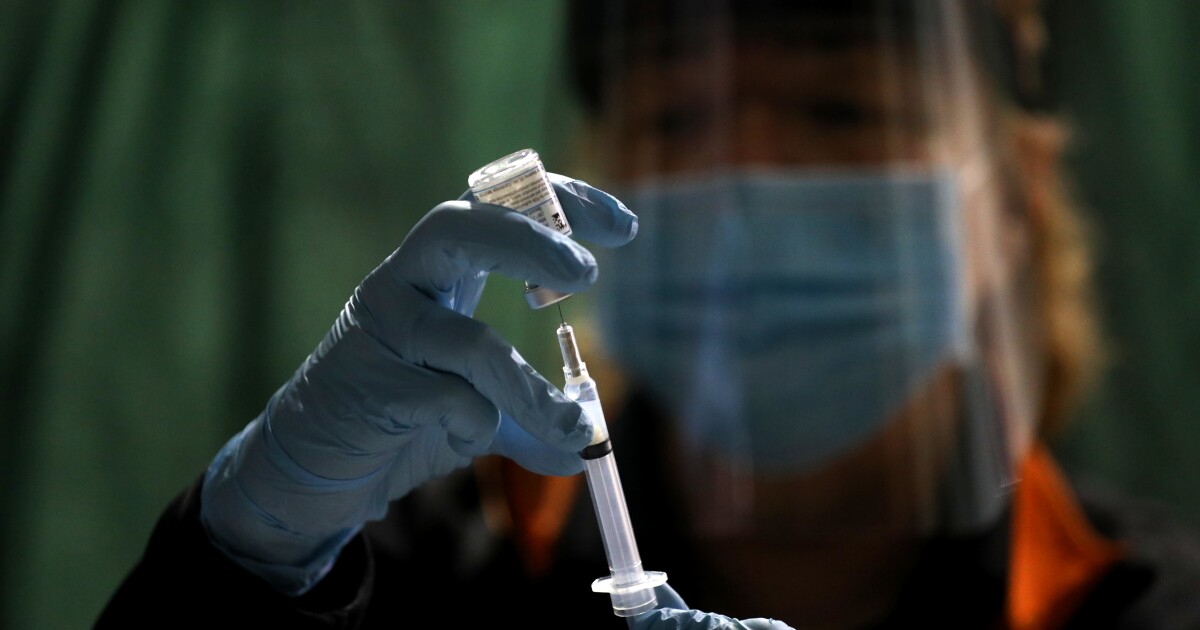The COVID-19 vaccine, developed by Moderna and the National Institutes of Health, has caused very few cases of severe allergic reactions during the first three weeks of its administration across the country, according to a new report from the Centers for Disease Control. & Prevention.
Among 4,041,396 doses given over 21 days, a total of 10 cases of anaphylaxis were confirmed by CDC investigators. Another four cases of possible anaphylaxis are still being investigated.
No deaths were associated with the vaccine.
“Based on this early monitoring, it appears that anaphylaxis after receiving the Moderna COVID-19 vaccine is a rare occurrence,” the researchers wrote in the CDC’s weekly report on morbidity and mortality on Friday.
The authors calculated that there were 2.5 cases of anaphylaxis for every 1 million doses of the Moderna vaccine administered. A similar study of the COVID-19 vaccine developed by Pfizer and BioNTech reported that there were 11.1 cases of anaphylaxis for every 1 million doses of the vaccine during the first ten days of administration.
Anaphylaxis is a serious allergic reaction that can be fatal if not treated immediately. It can be caused by a vaccine, or by exposure to certain foods, medications, insect stings or latex. The usual treatment is an injection of epinephrine, which relaxes the muscles that prevent air from reaching the lungs.
The ten cases have been reported to the Vaccine Adverse Event Reporting System, which the CDC is holding at the Food and Drug Administration to detect safety issues that arise after vaccination of vaccines to the public. They were spread across the country and had different vaccines.
A total of 1,266 side effects associated with the Moderna vaccine were severe enough to be reported during the three-week period. This is a rate of 0.03%.
In comparison, the Pfizer-BioNTech vaccine had a 0.2% side effect during the first ten days.
This is what the CDC investigators learned about the ten cases of anaphylaxis:
• The patients were between 31 and 63 years old, with a mean age of 47.
• All ten patients were women. Even considering the fact that women make up more than 60% of all people who have received the Moderna vaccine, the skew is noticeable. In general, 80% of cases of anaphylaxis reported to VAERS involve women, the researchers noted.
• The mean duration of onset of anaphylactic reactions was 7.5 minutes after receiving the vaccine.
• Nine of the patients started experiencing symptoms within 15 minutes, including one who contracted her first symptom just 1 minute after she received the shot. The tenth patient showed no signs of problems before 45 minutes had elapsed.
• Four patients were treated in the hospital’s emergency room and then sent home.
• The remaining six patients were admitted to a hospital. Five of them ended up in an intensive care unit, and four of them had to have a plastic tube threaded into their trachea to breathe.
• Nine of the ten patients had a history of allergies, including six who had previously had an allergic reaction to medication.
• Five patients had previously experienced anaphylaxis, although none of their cases were caused by a vaccine.
The CDC authors confirmed another 43 cases of other allergic reactions, of which 60% were considered “nonsensical”. Patients have skin rash or itchy skin, an itchy feeling in their mouth and throat, a feeling of tightness in their throat, and breathing symptoms.
Half of these patients experienced symptoms within 15 minutes of receiving the vaccination, and 73% of them developed symptoms within half an hour.
In 60% of cases, patients have a history of allergic reactions, usually to medication or food.
The 43 patients were between 22 and 96 years old and 91% of them were women.
On December 18, the FDA granted emergency use for the Moderna vaccine. The Pfizer-BioNTech vaccine was approved for emergency use a week earlier.
The CDC recommends that anyone who has an “immediate allergic reaction” to a first dose of the Moderna vaccine or the Pfizer-BioNTech vaccine should not receive a second dose. In addition, patients should be asked about allergic reactions in the past before receiving any vaccine, the agency says.
Vaccination sites are advised to monitor people for up to 30 minutes after receiving the injections, and to have epinephrine on hand to treat someone who has a bad reaction to one of the vaccines.
